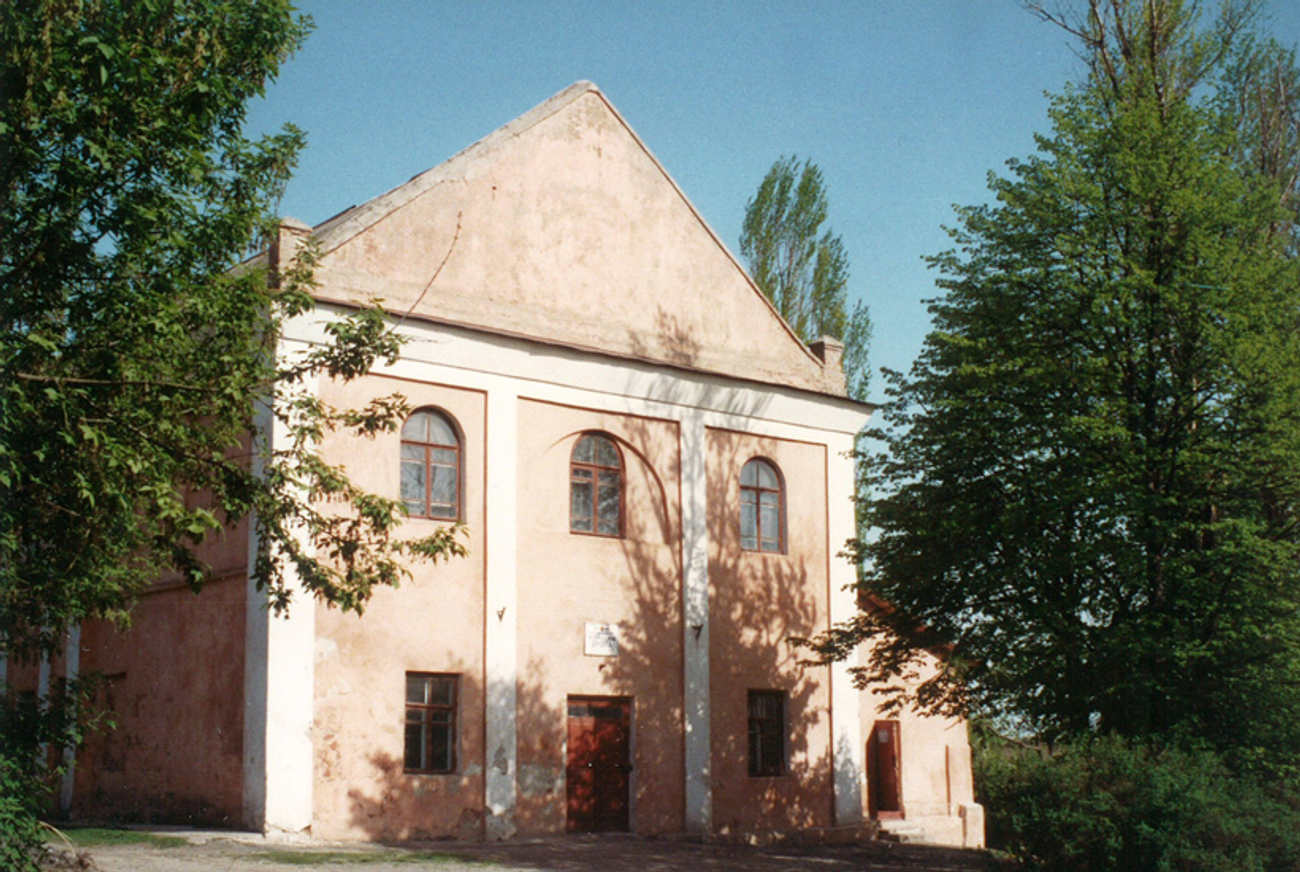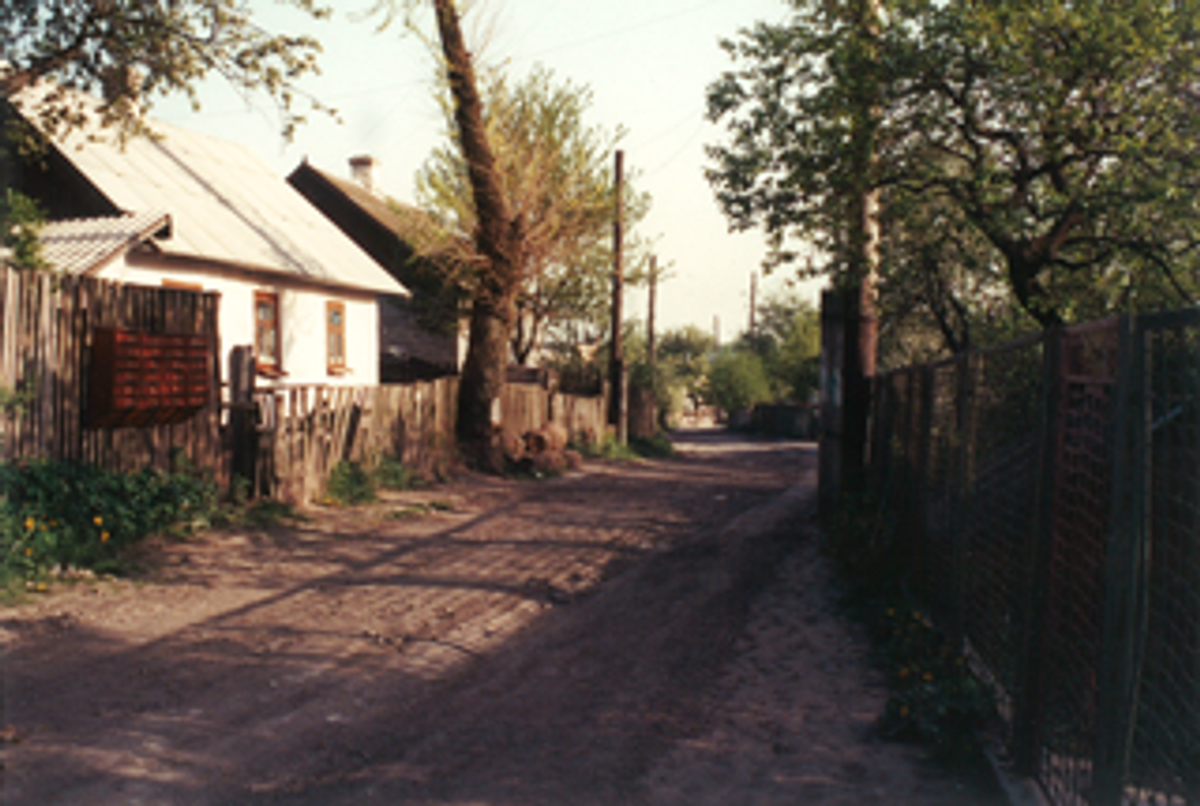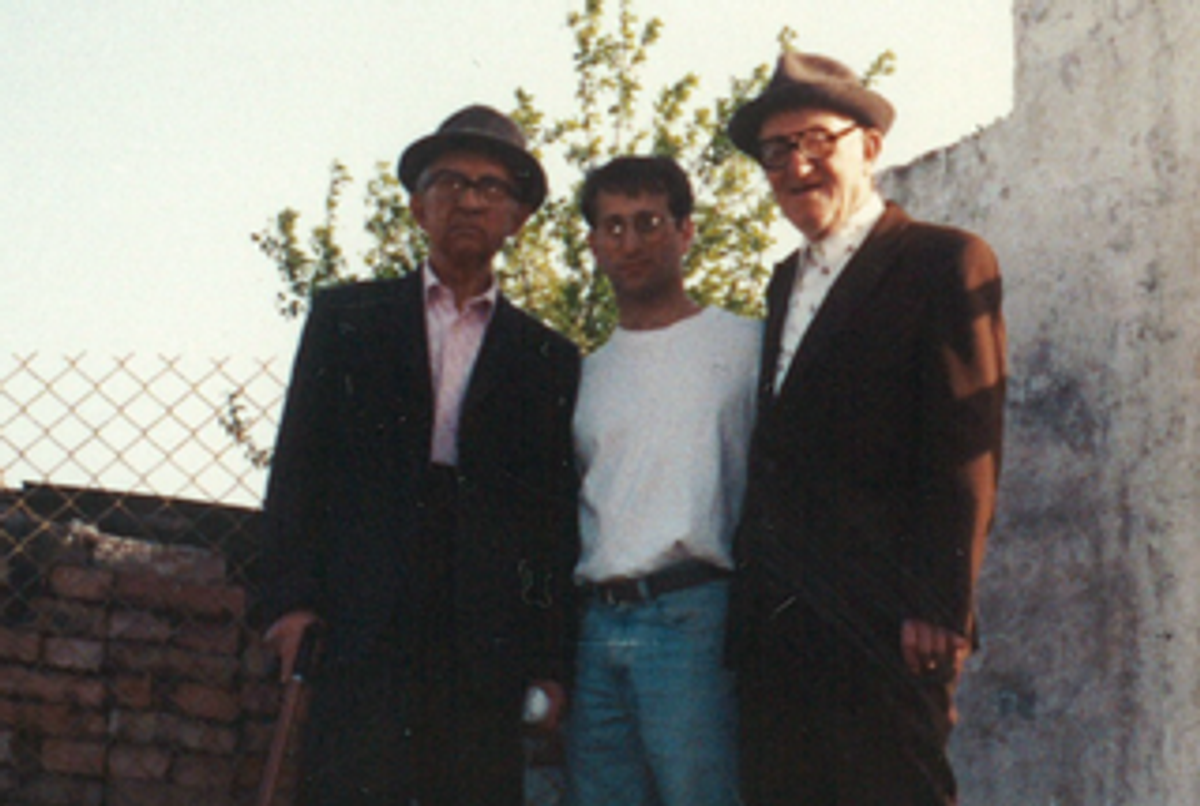Digging Up My Jewish Roots in My Grandfather’s Ukrainian Village
My grandfather told me his hometown no longer existed. But I found it—and finally came to appreciate my own heritage.




Before I left for a tour of the Soviet Union in 1991, I asked my grandfather about the Ukrainian village where he grew up. There’s no use trying to find it, he told me confidently in his deep bellow, it no longer exists.
Yet two years later, I was there, standing inside the dilapidated synagogue in Shepetovka. I stood face-to-face with four elderly men wearing loose-fitting suit coats, slacks, fedoras, and button-down shirts. The lines on their drooping faces were pronounced, their movements tentative, and their eyes curious. Realizing that these men might have had a shared experience with my grandfather, or could have known his family, I asked eagerly if they knew if I had any relatives still in the area.
“Young man, the synagogue you stand in today used to be filled with many worshipping Jews,” one of them told me. “It was a beautiful place with new scrolls, ornate walls, stained glass, and prayer books. You see what has happened? Today, we are a very small community. We once had 40,000 Jews in the region. Now we have maybe 500. There was a long history here, and now it is gone.”
He paused and I looked down, saddened and ashamed at my ignorance. What I had learned of the Holocaust in school was their reality. They had lived through more than I could comprehend. While I had taken my Judaism for granted, these men had struggled to exist as Jews. I took my backpack off and placed it gently on a wooden chair beside me. Suddenly, an unfamiliar feeling of pride, belonging, and Jewish identity overcame me. I was 23, but this was the first time I had ever felt such a connection to my religion.
I had come to Shepetovka hoping to find out more about my grandfather’s life. Instead, I discovered more about my own.
Growing up in Newton, Mass., I went to a Conservative temple and identified as Jewish, but relating to the religion was always a challenge. Although we went to synagogue periodically, the Hebrew words seemed to just wash over me. I attended Hebrew school, became a bar mitzvah, participated in USY events, and even traveled to Israel; nothing clicked. At home, we celebrated the Jewish holidays and I loved how they brought our family together, yet they didn’t really bring me closer to Judaism itself. In college, despite attending a handful of Hillel services and events, I remained apathetic, uncommitted.
When I graduated college in 1991 with a degree in Soviet and East European Studies, without any real career direction, I had a choice to make: live at home with my parents, or do something adventurous. I decided to embark on a 30-day, post-collegiate youth tour to the Soviet Union. With bleak job prospects at home, I researched companies doing business in Russia and set up interviews prior to leaving. Unlike the rest of the people on the tour, my goal was not only to see the sights. My goal was to find a way to stay.
The first few weeks abroad were full of excitement—tasting my first bowl of borscht, visiting ornate palaces, gardens, and museums, trying to communicate in Russian, and navigating the Leningrad Metro. Even with our hectic schedule of visits to tourist sites, the tour operators followed through on their commitment to intense Russian-language learning. Each morning we had mandatory classes and throughout the day were challenged to speak only in Russian.
Two weeks into the tour, with approval from my guide, I traveled alone to Moscow to attend a pre-arranged interview. Meeting with a middle-aged businessman from South Boston who had been splitting time between Russia and the United States for some time, I felt comfortable listening to him drone on in his Boston accent about life in Moscow. At one point during the conversation, I peered out the window behind him and was surprised to see columns of tanks and armored personnel carriers rolling toward the center of the capital. I had learned about Gorbachev’s policies of Perestroika and Glasnost and how these reformist policies put him at odds with the military and KGB—could this be related? As we soon learned, this was an attempted coup. I hailed a taxi that dropped me off near Red Square, where I walked through protests, talked with soldiers, and climbed atop a tank to get some photographs. After 48 hours, the attempted coup ended, but the unraveling of the Soviet Union could not be stopped.
I stayed in the new Russia for two and half years, teaching English in St. Petersburg (Leningrad reverted to its original name in September 1991, just a month after I arrived), and later working for an American real-estate development firm in Moscow. I spent many nights drinking vodka with newfound Russian friends debating the pros and cons of Gorbachev’s reform-minded policies, discussing the real impact of hyper-inflation on families. I also experienced first-hand why the early 1990s were aptly called “The Wild West of Russia.” At work, I interacted with clients from around the world but also with the new breed of Russian mafia who conducted business on their own terms. From being offered bribes of up to $15,000 to being intimidated with firearms, I grew accustomed to expecting the unexpected. Socially, the situation was just as volatile. The mafia was everywhere. At times, a basic night out dancing could quickly spiral into an evening filled with threats, stabbings, or worse.
I met people through work and friends and, in one circumstance, I became acquainted with a young Russian man in his 20s who asked about life in America—specifically about the Jews. His pointedly direct approach was unnerving, but as it turned out, his curiosity was genuine: He had never met a Jew and was fascinated to get to know one. Then, in the middle of 1993, I became friendly with a young woman named Oksana. When she asked why I had come to Russia, I told her I wanted to improve my language skills, but I also let her know that I wanted to better understand the land where my ancestors had come from. I explained that my grandfather, who was still alive at the time, actually grew up in Shepetovka. I told her what he had told me: that his village didn’t exist anymore. But she knew better and introduced me to a friend of hers from Shepetovka named Yuri. Without hesitation, he agreed to travel with me to search for my grandfather’s former home.
Before I made the trip with Yuri, I called home and spoke with my parents, who filled me in further on my grandfather’s upbringing. Coincidentally, my sister, Sheryl, had recently conducted a few interviews with him, so the information was fresh. While I knew he was one of four children, and was the only one chosen by his uncle and aunt to emigrate in 1919, I didn’t realize how central the synagogue was to his family’s life. They lived close to it, frequented it often, and their social circles revolved around it.
He also revealed to Sheryl that he had left during a time of growing concern in Ukraine, as pogroms were increasing in frequency. He recounted one episode when a pogrom formed outside his house while the family was preparing for the Passover Seder. A pipe bomb flew through the window and could have wiped them out. Instead of detonating, however, it landed in the pot of borscht my great-grandmother was cooking and was defused.
At the end of the phone call, my parents handed the phone to my grandfather so he and I could talk. Although intrigued by the prospect of my trip, he steadfastly insisted that there was no purpose in going.
Arriving in Shepetovka via overnight train from Moscow on a glorious summer day, I followed Yuri through the vibrant, modern section of town where paved sidewalks and roads, well-kept houses, and mature trees and manicured blooming bushes were the norm. We turned a corner, and a wide, clean sidewalk led us alongside a four-lane road and we passed a newly constructed red-brick apartment building. Approaching a beautiful pond surrounded by large, leafy trees and green brush, we watched as people walked hand in hand, frolicked on the wooden pier, or enjoyed the natural scenery from benches.

I grew more curious and intrigued as we approached the older section of Shepetovka. When we came to the point where the road literally ended and became dried, sun-cracked dirt, Yuri didn’t need to tell me we’d arrived at the part of town where my grandfather had lived. Buildings in dire need of spackle, paint, and general rehab surrounded us. As we walked, we stopped people going to work, walking their dog, or simply holding hands and asked for directions, finally ending up in front of a faded red structure.
The building was devoid of any Jewish markings, so I was uncertain whether we were in the right place. We circled it, looking for any clarifying information. Then, in the back, we saw a brown door with a small, blue sign on it: Synagogue of Shepetovka. We knocked but heard nothing. Knocking again, we heard a faint shuffle from within. Then, a loud thud. The door burst open with a kick from inside, and out popped an older gentleman with dark-rimmed glasses and a bright smile. He invited us in, and we introduced ourselves.
As the conversation turned to the number of Jews remaining in the region, I felt uplifted by an unfamiliar feeling of pride and connection to my heritage, but I was also engulfed in feelings of deep shame. My childhood had been replete with opportunities to connect with my religion, to appreciate my heritage, and to give back to the Jewish community. But I had taken it all for granted. I looked into the eyes of these men, who struggled and fought to maintain what connection they could to Judaism, and I vowed to live my future differently than how I lived my past.
When I returned home later that year, I sat around my parents’ kitchen table with my grandfather, showing him pictures of his birthplace, talking about what I saw, and handing him a few packets of sugar from the very factory where his father worked. Silently, he looked intently at every picture, tears visibly forming in his eyes.
I developed my own theory as to why he never talked about Shepetovka. He knew, in his heart, that once the letters stopped coming in the early 1940s, his relatives were gone. And, with his family gone, the village he grew up in, the place he knew as home, was also no more.
To me, however, the visit to Shepetovka was the concrete experience I needed to spark a commitment to my heritage and to my religion. I now understood the importance of marrying Jewish, raising kids Jewish, and being involved in my community and synagogue. My newfound connection to my religious heritage helped me gain a clearer perspective of who I am. I am not just me: I am my grandfather who survived, my great-grandmother who prepared that pot of borscht, my parents and grandparents who tried as best they could to instill Jewish values. I am all of them, and I share a responsibility that they once held.

It took a while for me to realize who I was, but I am a different person today because of my journey to Shepetovka two decades ago. It took time for the idea of marrying Jewish to become an important pillar in my life, but in 2000 I married my wife. We regularly go to synagogue and are involved in temple life, just as my grandfather’s family was a century ago in Shepetovka. As a former Brotherhood president, I cherish the community we have developed and the life filled with Judaism that our kids are blessed with. Instead of Shabbat being a once in a while holiday as it was when I was as a young adult, it is welcomed into our house each and every week.
And, as I look around our home, with our mezuzot and pictures of family—including my late grandfather—I smile in awe of where we came from, where we are today, and where we will be tomorrow.
David A. Kalis is the author of Vodka Shot, Pickle Chaser: A True Story of Risk, Corruption, and Self-Discovery Amid the Collapse of the Soviet Union. Follow him on Twitter @thedavidkalis.